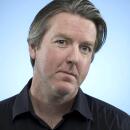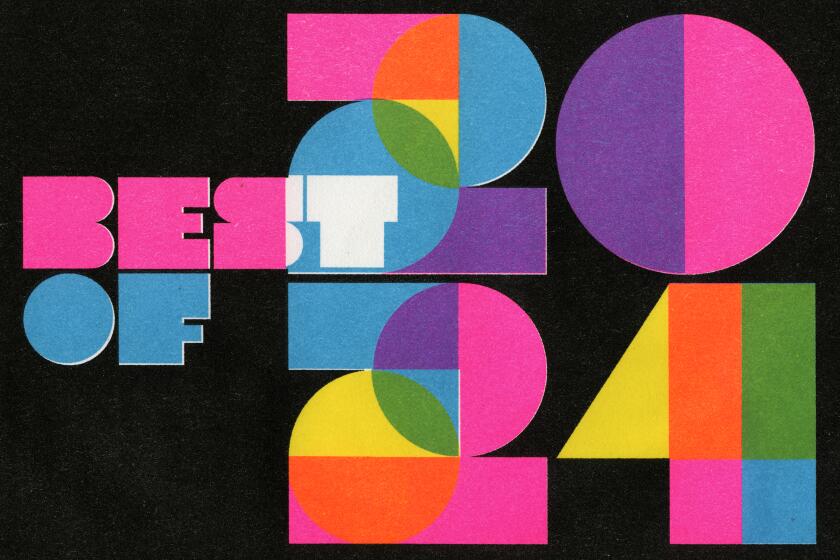Endeavour’s voyage into L.A.’s public space
Like a Dodgers fan showing up in the top of the fourth inning, Endeavour arrived noticeably late to Sunday’s big party at the California Science Center in Exposition Park, delayed by the notorious unpredictability of using surface streets to get from one side of Los Angeles to the other.
In that sense, the retired space shuttle seemed to confirm a familiar stereotype, but in other ways its trip across the city — and our collective excitement in seeing it live — efficiently demolished a series of myths about Los Angeles.
In a city supposedly obsessed with the fake, more comfortable with re-created or exaggerated than authentic spectacle, people relished seeing the real shuttle — scratched, dented and otherwise beat up by millions of miles of space travel — up close.
FULL COVERAGE: Shuttle Endeavour’s final journey
In a city blasé about celebrity and bold-faced names, watching this huge snub-nosed object with the words “Endeavour” and “United States” stamped on its side in sleek, sans-serif black type was enough to prompt cheers, whistles, screams, shouts and even tears.
And perhaps most dramatic of all: In a city whose residents are accused of disdaining public space, the orbiter’s tour led Angelenos to crowd sidewalks 10 or 12 deep as well as drawing thousands of people who live north of the 10 Freeway to boulevards south of it. It packed gas stations and strip-mall parking lots with crowds.
I watched the shuttle glide by from a sidewalk on the south side of Martin Luther King Jr. Boulevard, a couple of short blocks west of Vermont Avenue, and what surprised me the most was how little of an anomaly it seemed to be — how the whole spectacle, for all its oddity, seemed a natural expression of L.A. character.
TIMELINE: Endeavour’s trek through L.A.
It wasn’t just that Endeavour, largely built in Palmdale, is returning to its home turf. It was also that the parade was a reminder of one of the most remarkable qualities of L.A.’s wide boulevards: that they are capable of absorbing almost anything without losing their fundamental personalities.
Mirrored-glass skyscrapers, rotating signs, buildings wrapped by ads for Hollywood movies, shops shaped like hats or ducks or doughnuts: None of them are capable of knocking the boulevards they line off-stride.
And neither could the shuttle as it slowly pushed east on Manchester Boulevard, north on Crenshaw Boulevard and east again on MLK. In a city where spectacle is often mobile — where we have always shown off in muscle cars or on skateboards — Endeavour seemed to fit right in.
INTERACTIVE: Space shuttle Endeavour remembered
The shuttle seemed big but not out of scale; it may have dwarfed the single-family houses along its route, but larger examples of boulevard architecture and infrastructure — gas stations, billboards, freeway overpasses — more than held their own in its presence.
Roughly the height of a two-story building, three stories at most, Endeavour rolled past long and low, its profile similar to Walt Disney Concert Hall, the Pacific Design Center and all those other landmarks lining our boulevards, designed by their architects to stretch wide instead of tall. Once its special pavillion at the Science Center is built it will rest vertically, but during its trip through the city it was horizontal and all the more at home for that.
Maybe it was the deliberate 2-mph pace, which left the whole city waiting impatiently in the warm sun for it on Sunday, or maybe the way the nose of the shuttle seemed raised in the air, but there was something proud, even a bit haughty, about the way the orbiter looked as it passed along its route.
BOULEVARDS: Crenshaw comes to a crossroads
But it was an approachable kind of pride. I was holding my 3-year-old daughter in my arms as Endeavour went by, and the first thing she asked me, as one wing glided overhead was “When do we get to go inside?”
While we were out on MLK, however, she was most interested in the street scene playing out in front of us: men selling churros and bottles of water and Spider-Man balloons; the 6-year-old girl named Kimberly who was sitting next to her along the wall of an auto-body shop, whom my daughter shyly sidled up to in hopes of an introduction; the middle-aged woman with the big hoop earrings and jangling bracelets shading herself with a bright blue parasol; the preacher with a bullhorn who called out, “Turn to the Lord and he will have mercy upon you,” loudly enough that she covered her ears as he went by.
The cynical take on Angelenos — an idea that a surprising number of us continue to subscribe to — is that we are somehow afraid or dubious of public space and prefer to gather within protected, sanitized developments like CityWalk or the Grove shopping center.
But the truth is that we desire real interaction as much as the residents of any big city. We just happen to live, work and drive along boulevards that have been remade over the last five or six decades to favor cars to such a degree that such interaction has become difficult, and in some places nearly impossible.
The Los Angeles Police Department warned in advance of the shuttle parade that Endeavour would be tough to get close to and asked residents to avoid sidewalks along its route. But people came anyway, and at least where I was, on MLK, the street and sidewalks left plenty of room for the crowd and shuttle to accommodate one another.
We may not have great public squares and many big neighborhood parks in Southern California, at least not compared to more traditionally organized cities such as New York, San Francisco and Chicago. But we have a vast network of wide, palm-lined boulevards, which along with our beaches and thanks to the climate — it was in the mid-80s Sunday, the 14th of October — give us a particular kind of public space that other cities lack.
It’s a pity that in recent decades we have asked so little of these streets. Every time we need them to operate in a different way, to adapt to new uses or temporary disruptions or celebrations, they seem to be up to the challenge.
They certainly were this weekend.
christopher.hawthorne@latimes.com
MORE:
CRITIC’S PICKS: Fall Arts Preview
TIMELINE: John Cage’s Los Angeles
More to Read
The biggest entertainment stories
Get our big stories about Hollywood, film, television, music, arts, culture and more right in your inbox as soon as they publish.
You may occasionally receive promotional content from the Los Angeles Times.











